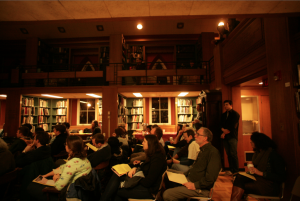What can someone meaningfully get out of a series of two-minute presentations that range in topics from digital scholarship to digital doodles?
On January 31st 2013, 20 professors, students, and staff came together in the Philips Wing of Magill Library for Lightning Talks Round II. Sponsored by SAVE AS, Lightening Talks is an event where students and teachers can present their works and ideas within a two-minute time frame. The theme of this event was digital scholarship and the speakers addressed their work within this emerging field.
While sitting in front of and along side my peers, faculty and friends I learned about the means and methods Cantor Fitzgerald Gallery interns implement while organizing exhibits. Aubree Penney taught me that there is a virtual Cantor Fitzgerald Gallery used by interns to simulate and organize exhibits prior to their arrival on campus. Who knew the simulation could consider the dimensions of an artist’s work to the hundredths of an inch?
Some projects applied new tools to old problems. How do you visualize trends in the arrests of participants of Occupy movements across the country? How do you make this data accessible? Samantha Shain attacked the project of mapping these social movements via an animated map of the United States. Her project led her to more questions: “Why did the arrests happen in the places that they did? Are there special and architectural implications of where the arrests happened?”
Other presentations questioned the very nature of those tools, and how they’re changing us. Professor Laura McGrane’s presentation titled “The User Paradox” addressed the anxieties and reservations many have towards computers, digital devices, and emerging software – how digital technologies perhaps use us as much as we use them. But who is this them? As Professor McGrane suggests the term user-friendly arose in corporate settings as an efficiency concept to promote a networked corporate mentality. So what is the difference in using and being used in the context of emerging technologies that demand more than we initially bargained for? I.e. should I use the apps that came equipped with my new iPod just because they’re there? Wouldn’t it be wasteful if I didn’t use them (even if I didn’t pay for them directly)? What did I pay for in the first place?
There was an air of simplicity, elegance, and poignancy to the talks. I left the event with an admiration of tact and presentation. What’s so great about Lightning Talks, as a themed event is that any student or faculty member can present their scholarship on a wide range of topics.
While sitting in the audience, I imagined all the projects, insights, and/or problems students and faculty engage with in their spare time, through internships, through research, or even during the summer, but who haven’t shared their work. For many, Lightening Talks is or can provide this opportunity.
If you didn’t get a chance to attend the event, but are interested in some or all of the talks, all 20 can be watched online: ds.haverford.edu/wp/saveas/2013/02/02/save-as-lightning-talks-round-ii/

